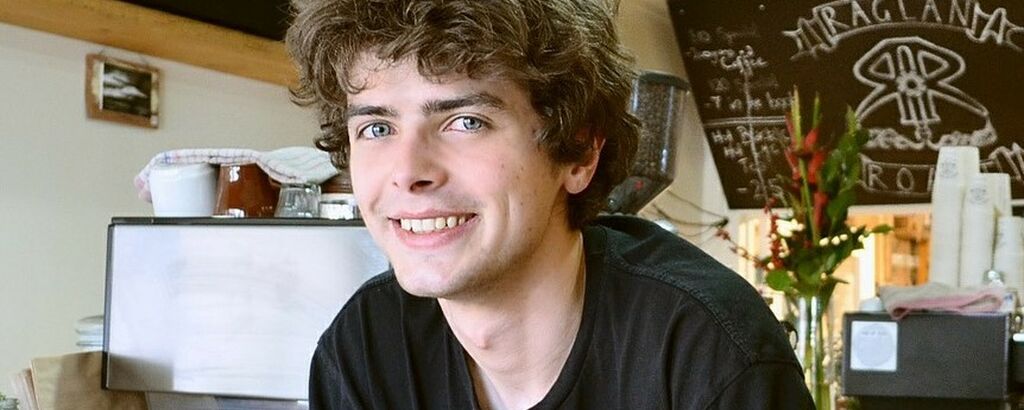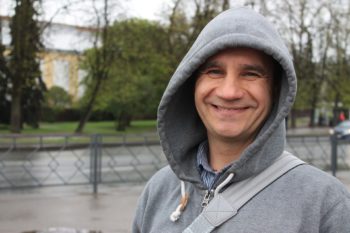
KYC’s Community Living Teams Make a Big Impact
Brad was kicked out of his friend’s apartment when he missed his rent payment for the third time. Since then, he’s been living on the street. He tried to get a new job months ago, but he couldn’t be hired without a valid photo ID. The stress of his living circumstances have been completely overwhelming. One night, a police officer found him walking aimlessly around a local parking lot, sobbing and confused, without any shoes on his feet. Unable to calm him down, the officer took him to the emergency room, where he was diagnosed and treated for a mental health concern. Brad received the emergency care that he needed at the hospital, but what happens next?
Although Brad’s story is a representation, some of our clients find themselves faced with similar, highly complex situations that are confusing to navigate. Kenneth Young Center’s intensive outreach teams work with exceptional determination to help community members through these kinds of challenges.
In the recent months, KYC’s new Front Door team and Community Support Team (CST) worked collaboratively to prevent 12 people from continuing to live in homelessness, and another 20 people from being unnecessarily placed in institutional care like nursing facilities. The Colbert/Williams Transition team helped an additional 12 people move out of nursing facilities who didn’t need to be there. KYC is thrilled to highlight this part of the incredible work the teams of our Community Living Department do each day.

The Front Door Diversion Program: Finding the Right Environment for Recovery
KYC’s Community Living Department provides, among many other services, The Front Door Diversion Program. The goal of this Illinois Department of Human Services program is to prevent Medicaid eligible people who are experiencing a mental health crisis from unnecessarily being placed into long-term care or returning to homelessness. This program can help people like Brad get back on their feet.
When a person is being discharged from the hospital after being treated for a mental health concern, this is a critical point in their care. As part of the discharge process, the person will be screened by hospital staff to determine if long-term nursing care is the next step to take.
If the person is released from the hospital and returns to homelessness, they will most likely have too little access to the care they need. In some cases, people are approved for long-term nursing care as an alternative to homelessness. If the person is referred to a long-term care facility, they will be living in a highly regulated environment and are left with very little financial resources or opportunities to try to move back out on their own.
The Front Door Program creates a pathway for a third option. When people can safely recover in stable housing in the community, they can begin the process of recovery in a realistic, supportive environment. All 12 of the people that KYC’s team members prevented from returning to homelessness were referred through this process.

Front Door in Action
Our team is connected to eight local hospitals throughout suburban Cook, Lake, and DuPage counties for the Front Door Diversion Program. When our team receives a referral following a hospital screening, there is no time to waste. Each referred person must be assessed at the hospital within 24 hours, and they often have a discharge date already scheduled as early as 12 – 72 hours from the time that they were referred.
A newly referred client will need a place to stay the same night they leave the hospital, so our team works to quickly connect them with the resources they need. Our staff locate a hotel for temporary housing and help the client obtain their medication, food, hygiene products, and clean clothing.
Our team members are masters of creative problem solving. In the past year, our staff have experienced (and solved!) unexpected situations such as:
- Hotel check in difficulties: In order to help a client check in to their first night’s stay at a hotel, our team had to first help them get a photo ID. Seven hours, two trips to the DMV, and one visit to a Notary later, the client had an ID, but was still unable to check in because they did not meet the hotel’s age requirements. Our staff had to act quickly to secure a place for the client to stay.
- Last-minute changes in plans: Despite coordinating with the hospital for a client to be discharged on a Monday, our team learned on the previous Friday that the individual was being transferred to a long-term care center. Our team got to the hospital before that transfer took place and helped the client avoid inappropriate placement into long-term care.
- Pharmacy and insurance troubles: After being discharged from the hospital, a client visited a pharmacy where they were told that their necessary medications would cost $1300. Our staff found that the client’s insurance had been incorrectly terminated, and negotiated a solution to ensure the client received their medications.
- Lack of basic needs items: Our staff arrived at a hospital to find that a client was discharged without appropriate shoes or clothing. Our team worked quickly to provide the client with these basic necessities.
While ensuring that the clients’ basic physical needs are met, our team members simultaneously engage their clients in the services they need to support their mental health. Depending on the client’s needs, our staff provide outreach services 1 – 5 times per week to ensure the client is staying on track to meet their goals. Our team also responds 24 hours a day to a crisis line that clients can call in emergencies.
After their clients are connected with the most immediate supports that they need, our staff connect them with longer-term resources that support recovery. Clients may be introduced to KYC’s psychosocial rehabilitation group (PSR), the Drop-in Center, and substance use programming. They may learn about programs offered through local park districts, municipalities, senior centers, or religious organizations. Our team provides their clients with the services that are personalized to help them reach their goals. Finally, our team members help their clients search for and obtain a more permanent home.

Impact Makers
Each person served through the Front Door Program is unique, and faces individual obstacles to finding a permanent home. They may have problematic credit, minor criminal history, transportation difficulties, or they may lack employment or other income sources. From helping their clients with interview skills, to helping them search for apartments, to helping them move in to their new homes, our CST members are there to support their clients along every step of the way.
Of the 20 people diverted from long-term care facilities, nine were living on the streets or in abandoned buildings. Four were living in unstable and unsafe housing, unsure from day to day where they would be able to stay. Thanks to the work of our amazing team members, these people each have a place to stay, and will hopefully soon have a permanent place to call home. They are connected with the wraparound services that they need to be supported as a whole person, and they have a team dedicated to helping them reach their goals.
How You Can Help

Give. Our team is always in need of items they can share with their clients as they face difficult transitions. Gift cards in small amounts to local restaurants (like Subway or Burger King, etc) for a quick meal are immensely helpful, especially when trying to navigate the numerous difficulties on the day of hospital discharge. In addition, cleaning supplies, hygiene products, and other items can help too. Your gifts can be given to individuals who are transitioning from homelessness to living in stability. To learn more about how to donate these items, check out our Amazon Wish List or contact our team.
Join our team. Our Community Living team is growing, and we currently have job opportunities available to become part of a team that makes a big impact. Check out all of our available positions here, or learn more about our Community Living Hiring Fair on February 15th, 2020.
Previous Article Next Article

